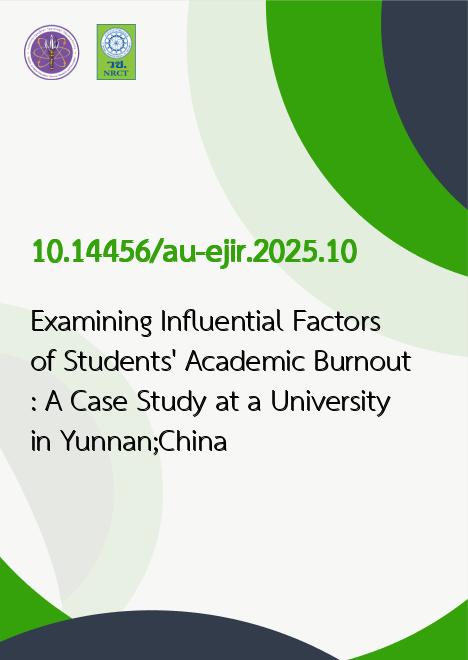
|
Examining Influential Factors of Students' Academic Burnout: A Case Study at a University in Yunnan;China |
|---|---|
| รหัสดีโอไอ | |
| Creator | Chuanchuan He |
| Title | 1. Examining Influential Factors of Students' Academic Burnout: A Case Study at a University in Yunnan 2. China |
| Publisher | Assumption University Press |
| Publication Year | 2568 |
| Journal Title | Journal of Interdisciplinary Research |
| Journal Vol. | 10 |
| Journal No. | 1 |
| Page no. | 93-101 |
| Keyword | Self-efficacy, Self-compassion, Professional Identity, Life Satisfaction, Academic Burnout |
| URL Website | https://assumptionjournal.au.edu/index.php/eJIR/article/view/9068 |
| Website title | JIR |
| ISSN | 2408-1906 |
| Abstract | Purpose: This study explores the significance of influences among four independent variables.self-efficacy; self-compassion; professional identity; and life satisfaction.on the dependent variable; academic burnout. Research design; data and methodology: The research employed the Index of Item-Objective Congruence (IOC) to assess validity and Cronbach.s Alpha in a pilot test (n=30) to measure reliability. A total of 140 valid responses from students at Yunnan Minzu University were analyzed using multiple linear regression to verify significant relationships between variables. Following this; a group of 30 students participated in a 14-week Intervention Design Implementation (IDI). Afterwards; the quantitative results from post-IDI and pre-IDI assessments were analyzed using a paired-sample t-test for comparison. Results: The multiple linear regression analysis indicates that self-efficacy; self-compassion; professional identity; and life satisfaction significantly impact students' academic burnout. Additionally; the paired-sample t-test results reveal significant differences in self-efficacy; self-compassion; professional identity; life satisfaction; and academic burnout between the pre-IDI and post-IDI stages. Conclusions: This study offers implications for reducing academic burnout through the enhancement of self-efficacy; self-compassion; professional identity; and life satisfaction. The findings provide a foundation for designing targeted interventions and support programs in higher education aimed at promoting student well-being; academic engagement; and long-term personal and professional development. |